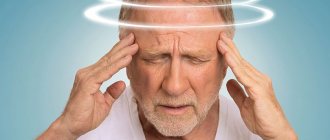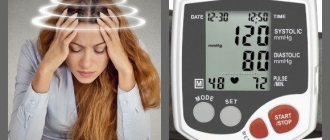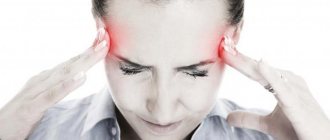Dizziness with nausea is a reason to consult a doctor. This condition can be a symptom of numerous illnesses, ranging from simple and harmless to fatal without treatment. Every person has encountered a similar sensation at least once in their life, but only persistent and painful dizziness becomes a reason to visit a specialist. In this article we will answer the question why women and men feel dizzy and sick periodically or constantly, when it is physiologically inevitable, and when it is a symptom of disease.
What is dizziness?
When you feel dizzy, this symptom often refers to different conditions. All symptoms united by this term can be divided into 4 clinical groups (see how patients describe a condition called “dizzy”).
Systemic (vestibular) vertigo
Systemic dizziness - a feeling of one’s own falling, rotational movements, swaying of objects in the environment. Usually this symptom is accompanied by other unpleasant sensations:
- Nausea
- Vomit
- Excessive sweating
- Hearing impairment
- Oscillopsia (when surrounding objects seem to oscillate)
In this case, the head is dizzy due to damage to the vestibular system at any of its levels.
Presyncope
This is a feeling of impending loss of consciousness, lightheadedness. Usually combined with nausea, pallor, rapid pulse, darkening of the eyes, and excessive sweating. This type of dizziness is associated with a drop in blood pressure or heart disease.
Balance imbalance
This is dizziness, rarely combined with nausea. Unsteadiness of gait and instability of posture, manifested in a standing position, deterioration in the dark are the main signs of this condition.
Psychogenic dizziness
This is a typical condition in depression, anxiety disorders and other mental pathologies. This symptom is accompanied by nausea, heaviness in the head and various hard-to-describe sensations (fog in the head, a feeling of viscosity, as if intoxicated, etc.)
Secondary symptoms
When dizziness occurs, there may be other symptoms that accompany it. You need to pay attention to them to help your doctor diagnose the disease.
The most common symptoms associated with dizziness are:
- slight nausea or vomiting;
- Strong headache;
- loss of coordination (orientation in space), feeling like you want to fall;
- cardiopalmus;
- pressure surges or changes are observed;
- bleeding from the ears or nose;
- general weakness.
You feel dizzy when you get up if:
- Pathologies of the vestibular apparatus. Unsteady gait, nausea, irregular heartbeat, and tinnitus are also observed.
- If blood flow in the inner ear is disrupted. Accompanied by increased blood pressure, sometimes memory loss is observed.
- Inner ear injuries. Vomiting, hearing loss, headache if the patient stands up suddenly.
- Neuritis. The head begins to feel dizzy in the morning for no reason, as well as nausea or vomiting.
- The presence of inflammation in the ear. There is usually a rise in temperature, as well as severe dizziness.
When dizzy and these signs are present, patients usually seek qualified help.
How is the sense of balance formed?
The main organ system responsible for a person’s position in space and sense of balance is the vestibular apparatus.
The peripheral section of the vestibular system is located in the temporal bone and is closely connected with the organ of hearing. The apparatus consists of a system of sacs and semicircular canals, which are filled with liquid endolymph, surrounded by perilymph and enclosed in a bony labyrinth. Inside the sacs and channels there are receptors that detect the slightest vibrations of the endolymph and a special membrane. Depending on the direction and strength of these vibrations, the receptors transmit an impulse along the nerve fibers to the brain. Passing through the cerebellum and medulla oblongata, impulses cause unconscious control over body position. The thalamus and cerebral cortex form a conscious reaction to acceleration and a person’s position in space. In addition, the above-mentioned parts of the brain form vestibulovisceral reactions. This is the response of internal organs to overload or malfunction of the balance organ. Such reactions include nausea, vomiting, rapid pulse, and arrhythmias.
If a defect occurs at some level of regulation (trauma, inflammation, etc.), then it receives incorrect information about the position of the body, which is called “dizzy.”
Pathological causes
Anemia
A decrease in hemoglobin levels in the blood can lead to a variety of symptoms. Feeling dizzy when you get up, nausea, pallor, chilliness of the hands and feet, cramps in the calf muscles, digestive disorders - this is not a complete list of the consequences of anemia. To exclude it, tests for the level of hemoglobin, red blood cells and ferritin are necessary. If obvious deficiency or hidden iron deficiency is detected, then iron supplements (Sorbifer, Ferretab, see iron supplements for anemia) are prescribed for at least three months.
Benign paroxysmal positional vertigo
The term BPPV refers to a fairly common cause of dizziness and nausea. It accounts for 20% of all calls on this matter, and in elderly patients – even 50%. The disease is caused by the formation of calcium carbonate crystals in the inner ear. This can be caused by head injuries, surgeries and ear infections, as well as age-related changes in the body. BPPV is almost always accompanied by nausea. The main distinguishing features of this condition include:
- the appearance or intensification of symptoms when changing position (laying down or getting out of bed, for example)
- worsening when throwing back and lowering the head (when washing hair in a beauty salon, when doing yoga)
- attacks of dizziness are often short-lived, may be present for several weeks, then disappear. After a certain time, the symptoms recur.
The Neelen-Barany test is used to diagnose BPPV. From a standing pose, you need to quickly lie down with your head thrown back 45° and turned 45°. Then repeat the test with the head in the middle position and turning in the opposite direction. The presence of dizziness and nystagmus during this test is considered a sign of BPPV. Nystagmus is rapid movements of the eyeballs; in this condition, it is short-lived and decreases with each repetition of the test.
Treatment for benign positional vertigo is necessary if symptoms are painful and last more than 2 months. If the exacerbations are short-term, then you can only limit your activities for this period. For example, sleep on high pillows at night, get up gradually, try not to tilt or throw back your head. If you don’t have enough patience to wait out the attacks, you can consult a doctor (vertebrologist, otoneurologist) for special maneuvers.
The Epley maneuver is one such treatment method. It is based on the movement of calcifications from the sensitive part of the inner ear to the insensitive part. To do this, the patient sequentially changes several positions, staying in each of them for 30-60 seconds. The doctor observes the appearance of nystagmus, asks if you are dizzy and allows you to change your position. After several attempts, BPPV usually goes away, if not forever, then for a long time.
Osteochondrosis of the cervical spine
Today, almost all people over 25 years of age suffer from this disease to varying degrees - it is a disease of civilization and an inactive lifestyle. Osteochondrosis of the cervical spine of 3-4 degrees is accompanied by periodic dizziness.
High or low blood pressure
A sharp increase in blood pressure, in addition to dizziness, is accompanied by headache, weakness, tinnitus, redness of the face, etc. When blood pressure drops, a person may also feel dizzy after standing up, darkening of the eyes, in addition, nausea, headaches, cold sweat.
Head injury
Falls, accidents, sports injuries and violence often lead to head and brain injuries. The consequences of such injuries range from mild short-term illness to coma and death. A concussion is classified as a minor injury. Its symptoms are:
- brief loss of consciousness (often, but not always)
- headache
- dizziness, unsteadiness when walking
- nausea and vomiting
- weakness, slight confusion (conspiracy, pause before answering a question)
Very often, traumatized people, especially teenagers, do not pay attention to these symptoms. Indeed, the main treatment for a concussion is rest and bed rest. But often such harmless symptoms hide bruises of brain tissue, intracranial hemorrhages and increasing edema. All this potentially leads to serious consequences: stunning, coma, and sometimes death. Therefore, after any head injury accompanied by the slightest discomfort and severe dizziness, you must consult a doctor.
Meniere's disease
The disease, in which endolymph pressure in the inner ear inexplicably increases, often causes dizziness with nausea. There are 4 main symptoms that distinguish this condition:
- hearing loss
- occasional dizziness
- tinnitus
- feeling of fullness in the ears
Dizziness with Meniere's disease lasts from a few minutes to several hours, often accompanied by excruciating frequency and vomiting. Sometimes sudden falls occur while consciousness is preserved. In more than half of patients, attacks decrease over time and self-healing occurs. But sometimes persistent changes in the inner ear cause decrease and even loss of hearing. Therefore, if the disease persists, operations are performed to eliminate excess endolymph pressure. To prevent attacks, you need to give up smoking, certain foods (coffee, chocolate) and avoid sudden head movements.
Anxiety disorders
The combination of personality traits and external stress sometimes leads to anxiety disorders. One of them, which is not so rare, is a panic attack. It can be triggered by any mild infection, conflict in the family or at work, consumption of alcohol and caffeine, and other factors. Signs of panic disorder include:
- dizziness
- nausea, vomiting, abdominal pain
- rapid pulse, feeling of the heart “jumping out”
- shortness of breath, chest pain
- fear of death
All these signs can appear in various combinations. Sometimes they are so strong that they lead to hospitalization. A panic attack is diagnosed if no abnormalities are found in the internal organs. This is a diagnosis of exclusion. If an anxiety disorder is confirmed, the doctor prescribes antidepressants and other drugs that relieve the attack and prevent the occurrence of new attacks. Learn more about the symptoms and treatment of panic attacks.
Vestibular migraine
A disease associated with an inadequate response of cerebral vessels is familiar to many people. Women of childbearing age most often suffer from migraine attacks, although a certain percentage of men and adolescents occur among patients. The main signs of migraine are:
- recurring throbbing headaches, nausea, and dizziness
- most often unilateral localization of pain
- nausea, photophobia and sound intolerance
- duration of attack from several minutes to several days
- provoked by menstruation, consumption of chocolate
Diagnosis is carried out based on the patient’s complaints, taking into account family predisposition and the absence of serious changes on MRI of the brain.
After confirming the diagnosis of migraine dizziness, the doctor will prescribe therapy: antidepressants (amitriptyline), calcium channel blockers (verapamil), dietary restrictions (chocolate, monosodium glutamate, smoked foods, caffeine, alcohol).
Vestibular neuronitis
Damage to the vestibular system by a viral infection causes a malfunction in its functioning. Symptoms of neuronitis include a combination of dizziness, nausea, loss of balance and nystagmus. Such attacks are short-lived and disappear completely after a few weeks. It is believed that the most common cause of neuronitis is activation of the herpes simplex virus type 1. Immediately before the attack, patients note a slight increase in temperature and other signs of a viral infection.
The doctor makes the diagnosis of vestibular neuronitis after a thorough examination. If all serious causes (stroke, tumors, multiple sclerosis) are excluded, then tests like Nielen-Barany are performed. For treatment, hormonal drugs (prednisolone) are used in a certain dosage, which reduces discomfort and speeds up recovery.
Multiple sclerosis
Multiple sclerosis is a disease of the nervous system in which the sheath of the nerves gradually deteriorates. The causes of the disease are unknown, but the autoimmune process plays a certain role. The affected areas of the nerves do not perform their functions, which leads to a variety of symptoms:
- dizziness
- loss of sensation in different parts of the body
- Optic neuritis
- pain
- depression or euphoria
- deterioration of memory and attention
- convulsions
- deterioration of motor functions
The disease occurs in the form of exacerbations and periods of calm, gradually leading to disability. The main diagnostic method remains MRI of the brain, which identifies lesions. Medicine is not yet able to cure the disease completely. But there are drugs (for example, interferons) that can slow the progression of multiple sclerosis. Sometimes corticosteroids and other medications are used for exacerbations. It is important to strictly follow your doctor's recommendations to delay disability.
Transient ischemic attacks and stroke
Impaired blood flow between the spine and the brain (in the vertebrobasilar artery) often leads to dizziness and other striking symptoms:
- dizziness with nausea and weakness
- double vision
- sudden hearing loss
- numbness or tingling in the face
- fainting
- numbness and paralysis of the arm or leg opposite the numb part of the face
- hoarseness, slurred speech
- swallowing disorders
Stroke is diagnosed using brain imaging (MRI, CT, ultrasound). Additionally, blood pressure levels are measured, a blood test is taken for coagulation, and the vessels passing through the neck are examined.
The difference between a stroke and a transient disorder is the persistence of symptoms. With TIA, blood circulation in the spasmodic artery is quickly restored, and health improves. But hemorrhage or necrosis of a region of the brain due to ischemia is a serious pathology. Urgent administration of anti-clotting drugs can stop the process and even reverse it. But it often takes years to restore all body functions.
Brain tumors
Brain tumors affecting the vestibular tract are one of the most serious causes of dizziness and lightheadedness. If a malignant or benign formation is located in the cerebellopontine angle, then the above symptoms are always present, especially with vestibular schwannomas. They are often accompanied by headache, ringing in the ears and hearing loss, double vision.
The main way to diagnose brain tumors is MRI or CT. If the diagnosis is confirmed, they try to remove the tumor surgically, if possible. Sometimes they are limited only to radiation and chemotherapy. The outcome of the disease depends on the degree of malignancy of the tumor, its size and location.
Labyrinthitis
Inflammation of the inner ear caused by viruses, bacteria or fungi leads to severe dizziness, nausea and hearing loss. The bony labyrinth, responsible for the sense of balance, has a close connection with the middle ear on one side and the brain on the other. Therefore, an infection that begins as otitis media may well penetrate deeper, causing damage to the vestibular apparatus, and then inflammation of the brain. Therefore, you need to know the symptoms of labyrinthitis so as not to delay your visit to the doctor.
- acute onset of illness
- most often unilateral otitis, with meningitis - bilateral
- dizziness with hearing loss in one or both ears
- nausea, vomiting
- temperature increase
- often - clear or purulent discharge from the ear, pain in the ear and temple area
Labyrinthitis is diagnosed based on the characteristic clinical picture. For viral inflammation, sometimes bed rest and observation are sufficient. In case of bacterial infection, antibiotics are prescribed, and the eardrum is opened to drain the pus. In advanced cases, an operation is performed to open the mastoid process and remove purulent streaks. The feeling of lightheadedness and dizziness disappears gradually, along with the restoration of hearing. Since with labyrinthitis there is a risk of persistent hearing loss and brain complications, self-medication in this case is unacceptable.
Causes of dizziness in men and women
According to some researchers, women suffer from dizziness more often than men. This phenomenon is explained by the fact that men are less likely to go to the doctor in cases where this is the only complaint.
Provoking factors for attacks of dizziness in both sexes are:
- at a young age, most often it is: vegetative-vascular dystonia;
- chronic violation of the work and rest regime;
- abuse of drinks containing caffeine;
- alcohol and nicotine intoxication.
- as a symptom of hypertension;
However, there are also features of this pathology that depend on gender.
Women are susceptible to this pathology:
- Due to the physiological characteristics of the body (monthly blood loss, pregnancy), women more often suffer from iron deficiency anemia, which provokes attacks of dizziness.
- In the second and third trimester of pregnancy, the enlarged uterus with the fetus mechanically compresses the blood vessels, as a result of which blood flow to the heart decreases and dizziness increases. It should be noted that in this case the attack occurs in the supine position.
- Women are more susceptible to psycho-emotional stress , so dizziness often accompanies mental disorders.
- Against the background of migraine as a harbinger of an attack or accompanies the cephalalgia phase.
- BPPV (discussed below).
Men are characterized by so-called nocturic dizziness and fainting. These conditions occur when urinating at night or immediately after it. The reason is a sharp transition from a horizontal to a vertical position (when getting out of bed) and emptying the bladder in a vertical position.
Our website also discusses in detail the issue of the causes of dizziness when tilting the head.
Dysfunction of the vestibular apparatus
This is a pathology caused by congenital failure of the vestibular apparatus (bilateral vestibulopathy). There are other names for this pathology - sea sickness, air sickness, car sickness.
The main features are:
- occurrence in persons in moving vehicles;
- incoming dizziness;
- combination with nausea, vomiting, rapid breathing;
- feeling of anxiety when thinking about the upcoming trip in transport.
At the same time, people suffering from this pathology can, for example, dance the waltz.
Dizziness due to diseases of the nervous system and blood vessels
This symptom may occur:
- in persons suffering from brain tumors;
- in case of acute cerebrovascular accident;
- circulatory disorders in the vertebrobasilar region;
- with pathological narrowing (stenosis) of cerebral vessels;
- epileptic disease;
- migraine.
Dizziness in this case is accompanied by neurological symptoms in the form of:
- decreased sensitivity in any half of the body;
- impaired motor function of the limbs;
- impaired swallowing and speech;
- double vision;
- impaired coordination of movements. Read more about the causes and treatment when coordination of movements is impaired in our article on a similar topic.
Questions that the doctor will ask at the appointment
- How to describe your condition without using the word “dizziness”?
- When you feel a fall, in which direction are you “thrown”?
- Is there a feeling of fear when you feel dizzy?
- Is this symptom constant or intermittent? Are the episodes quick or long?
- Does dizziness begin abruptly or gradually?
- Have you had a history of head and neck injuries?
- How does the symptom behave in a sitting, lying, standing position, or when turning the head?
- Is there any hearing loss or decrease? Tinnitus?
- In the last week before the onset of the disease, were there any signs of acute respiratory viral infection?
- How often do headaches occur?
- What medications do you take regularly, or did you take them for the first time before the attack?
How to test?
You can do a special home test that can help detect orthostatic hypotension when you lie down and when you turn your head.
This will require a little care, a piece of paper, a stopwatch and a pen. Proceed as follows:
- Several times (2-4) while standing, measure the pulse and calculate a stable average result, write it down;
- They do the same actions, only in a supine position, and record the resulting number;
- Next, the person must get up and count his pulse in a minute, 3 and 5, and write down the results.
The task is to understand the difference in pressure, how quickly the normal rhythm is restored when changing position.
The results should be checked according to the following rules:
- 11 beats will be a normal indicator for a healthy body;
- if there are from 12 to 18 strikes, there may be a problem, but this does not threaten serious consequences, you need to devote time to prevention;
- if the number of beats is more than 18, this indicates serious problems with blood pressure and redistribution, and therefore the need for an urgent trip to the doctor.
It is worth considering that such a home test gives a rather vague result, which only allows you to decide whether you need to go to the doctor or not.
In any case, an accurate diagnosis and treatment can only be determined by a qualified doctor.
Treatment
Therapy for such an unpleasant condition depends on the cause that caused it.
- Meniere's disease can sometimes be treated with Betahistine. A low-salt diet and diuretics are also recommended.
- in case of circulatory disorders in the area of the vertebrobasilar artery, antiplatelet agents (aspirin) and anticoagulants are prescribed. Antihypertensive therapy (for hypertension) and statins to lower cholesterol levels are often necessary.
- for severe nausea and vomiting accompanying dizziness, prochlorperazine and thiethylperazine are prescribed. Taking such drugs is possible only in case of acute dizziness, after examination by a doctor, and only for a short course.
- for damage to the inner ear and paroxysmal vertigo, the special exercises described above are effective. Repeated repetition of situations that intensify the symptom also benefits. As a result, the brain adjusts and begins to control the dizziness. Not everyone can tolerate this method, especially if they need to work and do household chores.
- Panic attacks require psychotherapy, antidepressants and other drugs that affect mental activity and the nervous system.
- at home, before visiting a doctor, treatment methods are limited. You can limit your head movements, take a comfortable position, drink some citrus juice, open the windows for air access. Anti-nausea and vomiting medications may mask important symptoms, so it is not recommended to take them until a definitive diagnosis is made.
Interesting Facts
- Benign paroxysmal positional vertigo worsens with a lack of vitamin D in the autumn-winter period
- Mild dizziness can be an occupational illness for specialists working with MRI machines. There is evidence that changing magnetic fields affect the inner ear. It is noteworthy that such effects do not apply to patients.
- The more often a person experiences attacks, the faster the brain gets used to them and the feeling of being dizzy disappears. Anti-nausea and unsteadiness medications can "relax" the brain, causing each attack to continue to be painful.
Author:
Evtushenko Anna Aleksandrovna obstetrician-gynecologist
Feeling dizzy when getting out of bed: what could the symptom indicate?
Almost all of us periodically ask ourselves the question: “Why do I get dizzy when I get out of bed?” First of all, it should be noted that dizziness during a sharp rise is not a disease in itself. Often this is just a signal from your body about problems with its functioning. But if dizziness is not an isolated case for you, then this should be a reason to go to the doctor and get diagnosed.
Vertigo (the scientific term for dizziness) sometimes occurs as a result of a lack of oxygen to brain cells. However, a clear etiology for this condition is difficult to identify. First you need to understand the additional symptoms.










